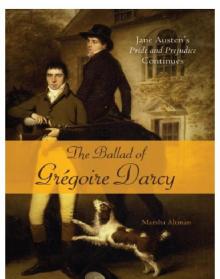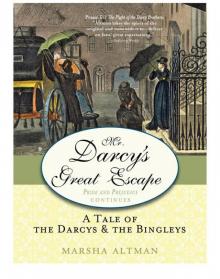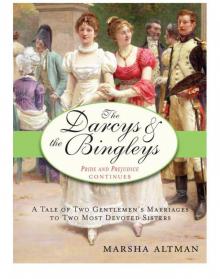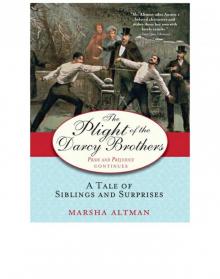- Home
- Marsha Altman
The Plight of the Darcy Brothers Page 7
The Plight of the Darcy Brothers Read online
Page 7
“If you would allow, sir, I'd like to give you a few stitches on the top, perhaps no more than three or four.”
“If I would allow it?” the man said, his cultured, obviously high-class accent slurred by drunkenness. “I bleed. Go ahead.”
“I usually prefer consenting patients when they're conscious,” Dr. Maddox carefully explained, and went about his business. His patient rambled on as the doctor did his work, explaining that Lilly had attempted to renegotiate the price after the deed. When he refused, she had stabbed him, and she was a “crazy woman.”
Actually, Dr. Maddox suspected Lilly was quite sane, if a bit in love with the knife, as this was not the first patient with a stab wound that he had been called to, but he kept that counsel to himself. He focused instead on stitching the wound while having his patient press down on the lesser wound area until the bleeding stopped. In the end, five stitches were required, more than Lilly's usual.
“These will need to be removed in about a week. I can give you my card, or you can have someone else do it,” Dr. Maddox told his patient.
“I'll take your card, but I may not use it,” the man said, putting his shirt back on with a grunt of pain.
“I understand completely. Keep the wound clean. I recommend boiling water and letting it cool before putting it over the wound to prevent infection. Do this at least once or twice a day until the stitches are removed, keep the area bandaged with something clean, and you should prevent infection, which, of course, would be most serious.” He quickly put his instruments away, washed the blood from his hands, and stood up. “Good luck.”
The patient raised his bottle in a sort of toast. “Good job, Doctor. I did not get your name.”
“Dr. Maddox,” he said, and doffed his hat.
He was nearly out the door when his patient said, “You have not asked my name.”
Maddox turned back to him, took one look at the man in the diminished light, and said, “No.” Then he left with all expediency.
When he returned to his house, his manservant was up to greet him, as these calls were not unknown, and Dr. Maddox found it convenient to drop his bag with a servant and be able to reasonably expect the instruments to be cleaned and ready in the morning. He found himself tired, probably from the hour, and inquired as to his wife. “Mrs. Maddox is retired.”
Of course she was. The sky was practically lightening. He did not want to disturb her, so he took to his own bedroom, as was his custom when returning from a late call, and collapsed on the bed.
THE INVITATION
“DANIEL! DANIEL, WAKE UP!”
Dr. Daniel Maddox opened his eyes to the normal blurry world and a figure that was undoubtedly his wife. He knew her figure, but the red hair always gave it away, even if her voice didn't. Though her voice was not particularly piercing, it was very excited and, therefore, a little rattling to someone who was sound asleep. “What?”
“Daniel.” She leaned over, and he had only the vaguest idea of what the gesture was, being unable to see it with any clarity, until she kissed him on the head. “You won't believe what I have to tell you.”
“I already know you're with child.”
“Stop being a doctor for once,” she said. “We've been invited to a royal ball.”
That made him sit up. If not for the level of pure exasperation in her voice, he would not have begun to believe it. “What?”
“I know! I cannot properly explain it, unless you can. Here.” She handed him the invitation, which was very large in his hands.
He held it up to his face and let his eyes adjust to the morning—well, probably afternoon—light, as the letters became clear. “It seems we have. Dear, can you hand me my—” But she already had his glasses and put them in his hands. He put them on, and as the world became clear, he lay back and gazed at the invitation and then at his wife. She was dressed properly, so it must have been at least a decent hour of the morning, probably later. “I cannot explain it either.”
“You are descended from nobility.”
“I have never in my life spoken to the current earl of Maddox. Nor would he have the authority to invite me to a royal ball.” He gave her back the invitation. “But this is—uhm, good news. This Friday, so frightfully soon.”
“I know. I never thought I would say this about a ball, but I haven't a thing to wear.”
“Neither do I.” It would certainly cost him, but as they had no choice in the matter, and as his wife was exuberant over the idea, he was readily willing to spend every last shilling on her dress. He also had the wisdom not to share this with her at the moment. “I suppose something will have to be arranged.”
“You will not admit it,” she said, and kissed him as she sat down next to him, “but I know you had something to do with this.”
“If you are inclined to keep rewarding me as such, I will not contradict you.”
The invitation was set aside.
“Just so you know,” she muttered, “the Hursts are coming to dinner, and Charles may be in town in time to be invited.”
“And… and when is that, exactly?”
“In about three hours, dear.”
“Oh,” he said. “Good.”
As it turned out, Charles Bingley was in Town, arriving at his own townhouse just in time to be ready for dinner at theirs. “Business with my steward,” he explained, and nothing else was asked. “Everyone is well. I mean, nobody is sick, except from worrying.”
“Have the Darcys written?” Maddox asked over the first course. He felt it odd, sitting at the head of the table with guests far above his own station, even if they were all his relatives. Georgiana Darcy was also dining with them, as Caroline had a great affection for her, and since she was in Town, finding Pemberley “too closed and empty” for her liking.
“They wrote when they arrived in Calais, and Darcy reports that they are fine. His letter was a bit brief. Elizabeth's was longer, but it was addressed to Jane,” Bingley said.
“Never liked France,” Mr. Hurst mumbled over his soup. “Too much rain and too many vowels.”
Maddox stifled his laughter as Bingley gave him a smile, and Caroline announced the great news, which had everyone turning to the doctor, who merely shrugged.
“Isn't your uncle an earl?” said Mr. Hurst.
“He passed on long ago. I am not acquainted with the current earl. Not that that would explain it.”
“Are you going to meet the king?” Georgiana whispered, though loud enough for everyone to hear.
“He's not going into public these days, is he?” Mr. Hurst said.
“I hardly think a private ball qualifies as public,” Mrs. Hurst retorted.
“I heard he wasn't,” Georgiana said. “I mean… being seen.”
“Or they are not letting him be seen,” Caroline said. “It must be, because we have not heard anything in the papers for a while now.”
“The invitation failed to specify,” was all Dr. Maddox had to offer. “The Prince of Wales is the host. I suppose he will make a decision based on his father's particular mood at the moment, if we are meant to be presented to him at all—and I have no idea if we will be.”
“So you know something of his illness? I mean, beyond what we all know,” Bingley said, passing a dish of vegetables to his sister. “Perhaps that would explain it.”
“I sincerely hope they have no medical expectations of me,” Maddox said, and when the idea sank in, it worried him even more. “I've no expertise on the mind. No one does. It's too closely connected to the soul, perhaps. I only know what I've heard from other doctors who are more closely following the reports.”
“Which is?” his wife said expectedly.
“That his madness passes in and out, and sometimes he can be quite sane,” he said. “But apparently not enough to rule the country, as his moods are very unpredictable. I doubt his condition has anything to do with us, because he has the best doctors in the world treating him. I hardly believe they would resort to a Town doc
tor.”
“Terrible malady,” Mr. Hurst said. “Madness.”
“Is it treason to say that of His Majesty?” asked Georgiana innocently.
“Maybe in front of His Majesty,” Caroline said, “but not in this house. You are allowed to state the obvious, Miss Darcy.”
“Perhaps you will learn for yourselves,” Charles said. “Well, I think you're very lucky. I can't even imagine being invited to a royal ball. Darcy, surely, has been presented, but he's Darcy of Pemberley and Derbyshire. Do you have a sword, Doctor?”
“Oh goodness, no. Am I going to have to get one?”
“I believe that is part of the appropriate dress,” said Mrs. Hurst. “But perhaps not for a physician.”
“You could bring that scalpel of yours,” Caroline said, and Charles laughed in his seat next to her.
“Get a big enough scabbard for it, you should be fine,” slurred Mr. Hurst.
Dr. Maddox smiled and kept his nervousness to himself.
Bingley's business was brief, and he quickly returned to Derbyshire before the mystery could be solved. Caroline was exceedingly happy at the prospect of a royal ball, and Bingley was exceedingly happy to see his sister content. However the doctor was managing that, it was working.
Geoffrey and Georgie were there to greet him at the door, their skin coloration beginning to fade. During the day, when they were allowed to play about, not yet being of the age to have proper lessons (though Darcy had begun his son on reading and writing, but not particularly harshly), they were free to run about and could hardly be separated.
As the servants removed Bingley's coat, he inquired after his wife and asked that his other children be brought to him in his study. Before long, Jane appeared, carrying little Charles, and passed him off to his father as she kissed her son. Nurse arrived, carrying Eliza, but Jane waited until Bingley was settled with his son in his lap before passing a letter to him. “From Darcy.” It was only then that she took Eliza into her arms.
He broke open the seal and quickly scanned Darcy's elegant but precise script. He told Nurse to wait outside. When they were alone and the door soundly shut, he read it aloud.
To Charles Bingley,
Please be assured first that all is well and we are now on our way south. We have a stop of business to make in the east, but it is not terribly off course.
I have a request of you that may seem of an odd nature, and I would wish that, if you want to tell anyone of it, please restrict this conversation to your wife.
In the back right corner of my study is a small cabinet made of red oak. All of its three drawers are locked, as they contain financial records dating to my father's lifetime and possibly before. It has been years since I have been through any of them. You will find that the master key of Pemberley opens the first two drawers, but not the third. I made an attempt at opening it some years ago, but either the lock was rusted out, or I did not have the appropriate key. I could do nothing to open the drawer without destroying the cabinet, and I had no major interest in the cabinet beyond mere curiosity, so it has never been opened in my time as master of Pemberley.
Please take the keys and make some attempt to open that drawer, employing whatever methods may be necessary. In fact, I give you full permission to destroy the cabinet, but I imagine that, with your skills, it will not come to that. Please keep this task quiet, and if anyone asks, have Mrs. Reynolds called in. Inform her that I have given you the authority to do this, and that it directly relates to a matter I believe she is better informed of than I am.
If there are any documents in the drawer, please do me the additional favor of reading through them. In particular, I am looking for someone by the name of Bellamont, whether he or she was under my father's employ, and when. If you discover anything, please report it to me.
I will explain the matter in full detail when I return. I regret that the explanation is too complicated to give justice to now, as the road is very exhausting.
Many thanks,
Darcy
“What does he mean about the keys?”
“He gave me a set of the master keys of Pemberley before leaving,” Bingley explained, and quickly produced his own keys, which he used to unlock the bottom drawer of his desk. “Here.” He put a set of keys on the desk for display. “Oh, and these.” He reached into the drawer, sifted through the various Indian books there, and retrieved a set of lock picks. “I never should have told him that story. Now I'm going to feel like a common burglar.”
“Better than destroying the cabinet, I suppose. Do you think you can do it?”
“I've no idea. But if he's off saving your sister's reputation, I might as well aid him in some fashion. Are you accompanying me?”
“Let me put our children down for a nap, and then, yes.”
An hour later they were at Pemberley and greeted by a surprised skeleton crew, which included Darcy's manservant, who was waved off. They quickly made their way to the study. The cabinet in question was not hard to locate. It was in the back, obviously not in regular use, and the only one with precisely three drawers. “If anyone inquires as to what we are doing,” Bingley told the servant attending them, “please send in Mrs. Reynolds. Otherwise, Mr. Darcy's specifications were that we be left alone.”
The servant bowed and left, closing the great doors behind him.
“First,” Bingley said. He went through the ring of keys from Pemberley, but while one opened the first two drawers, Darcy was right that it did not open the bottom one. “It doesn't even fit. The lock was changed at some point.”
“Surely a locksmith can handle it.”
“Not without making a fuss. I think, knowing Darcy, he wishes to avoid that at all costs.” When his wife did not contradict him, he sat down on the floor and placed the lower pick into the lock, inserting the other one just above it and fiddling with it. “Rusted. But not impossible, I think.”
“You are quite the rogue.”
“I haven't opened it yet,” he pointed out. “Argh! What a difficult lock. You may wish to sit down… this may take a while.”
“Charles! I'm not currently with child.”
“That we know of.”
She gave him a smirk before having to greet Mrs. Reynolds, who entered very authoritatively with a grand opening of the door and silently awaited the explanation of why someone, even Darcy's in-laws, was messing around in her master's study.
“Mrs. Reynolds,” Jane said, “Mr. Darcy has written and asked Charles to retrieve some records from a particular cabinet for him. He said it pertained to a matter that you have some knowledge of, but he did not specify what that was.”
Mrs. Reynolds went through several changes of expression, but she nodded obediently and said nothing. She moved around the desk and looked at the rather hapless-looking figure of Charles Bingley on the floor working at the lock.
“I think that was the first pin… or me breaking it. Either one.”
“Mrs. Reynolds,” Jane said very calmly. “Do you have any idea as to the contents of this cabinet?”
“Oh no, Mrs. Bingley. I imagine if he keeps it locked, it's financial records, and I remember Mr. Darcy—Mr. Darcy's father—using it occasionally, but I came to Pemberley some years after the master's birth, and it has never been my concern.”
“Well, this should solve it,” Bingley said. “Yes, first pin, definitely. All right, first pin is the hardest. Or is it the last pin? I forget.”
Whether he remembered or not, he took some time in opening the lock. Mrs. Reynolds called for tea but brought it in herself and otherwise kept the door shut. She did, however, stay in the room and was not dismissed.
“There!” Bingley said triumphantly, as the sound of the lock very soundly turning open finally broke the silence in the room. He wiped the sweat off his brow with a handkerchief from Mrs. Reynolds and pulled the drawer open. Its hinges had rusted, so this took some work, but finally the cabinet revealed its treasure—pages and pages of documents. “Well, after al
l that, I was hoping for gold or something.”
“You did a good job anyway,” Jane said, and kissed her husband as he rose and pulled the records from the drawer, putting the huge stack on the desk. “Oh dear.”
“May I help you, sir?” Mrs. Reynolds said. “If you're looking for something specific—”
“Yes. A Mr. Bellamont, or records of his employment at Pemberley, if they exist.”
Mrs. Reynolds visibly paled, and the Bingleys stopped opening various folders to stare at her with the obvious intention of waiting for her to explain her reaction.
“Do save us the trouble,” Bingley said.
“Well.” For once, the elderly Mrs. Reynolds, usually sharp as a pin, began to look her age. “I did know her—and it is a Mrs. Bellamont. Or, properly, Miss Bellamont. The master seems to have forgotten, perhaps because of his age at the time, but she was his mother's lady-maid.”
“What else do you remember of her? I think Darcy will require more specifics.”
“Only that she was dismissed rather hastily, shortly before Mrs. Darcy's death. At the time, I was not the manager of the house, only the laundress, and so I don't remember—”
“It's fine,” Bingley said. “The date of Mrs. Darcy's death?”
Mrs. Reynolds supplied it. Mrs. Darcy had died twenty years earlier, days after Georgiana's birth, when a fever had overtaken her. The whole house had been devastated, especially, of course, the young Darcy, then thirteen.
That made going through the records much easier, as they were dated very accurately and in the traditional neat script of the Master of Pemberley. Annual salary sheets were signed and dated by Mr. Geoffrey Darcy and, in the earlier years, by his steward, Mr. Wickham. Before tremendously long, with the three of them working, they located the document specifying a termination payment for Miss Alice Bellamont. Oddly, Bingley noted that the termination came during Mrs. Darcy's confinement, a few months before her death.

 The Knights of Derbyshire
The Knights of Derbyshire Other Tales: Stories from The Ballad of Gregoire Darcy
Other Tales: Stories from The Ballad of Gregoire Darcy The Ballad of Gregoire Darcy
The Ballad of Gregoire Darcy Mr. Darcy's Great Escape
Mr. Darcy's Great Escape The Darcys and the Bingleys
The Darcys and the Bingleys The Plight of the Darcy Brothers
The Plight of the Darcy Brothers The Road to Pemberley
The Road to Pemberley